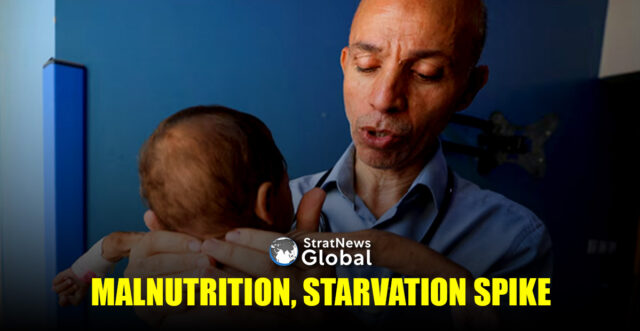Gaza’s hunger crisis has reached a critical tipping point, with dwindling stocks of fortified milk and therapeutic food pastes worsening shortages and driving more children into starvation, according to aid agencies, nutrition specialists, and the United Nations.
Almost two years since Israel‘s invasion, famine was formally confirmed for the first time in parts of Gaza on Friday, with almost a quarter of the population facing starvation, according to the Integrated Food Security Phase Classification (IPC), the main global hunger monitor working with the U.N. and other aid agencies.
After a global outcry at Israel’s severe restrictions on aid from March, its military began allowing more food into Gaza in late July.
But volumes are too small and distribution too chaotic to stop greater numbers of the enclave’s over 2 million people from becoming malnourished, while those who are already starving or vulnerable are not getting life-saving supplements, three hunger experts and aid workers from six agencies told Reuters.
Starvation Deaths Rising Sharply
According to figures from Gaza’s Health Ministry, verified by the World Health Organisation, deaths from malnutrition and starvation are spiking.
In the 22 months following the October 7, 2023, attacks by Hamas, 89 fatalities were attributed to malnutrition or starvation, mostly children and teens. Just in August, there have been 133 deaths, including 25 minors, the ministry said on Wednesday.
Many more could follow, the IPC said. Without a ceasefire and immediate large-scale and unimpeded aid, at least 132,000 children under the age of five were at risk of death from acute malnutrition through June next year, the monitor said, doubling estimates made in its last report in May.
“We are seeing the worst possible humanitarian catastrophe that we can even measure,” said Jeanette Bailey, a child nutrition lead at the International Rescue Committee, a New York-based aid organisation.
There are “going to be a lot more children dying, a lot more pregnant and lactating women suffering from malnutrition.”
Israel Disputes Figures
Israel does not accept that there is widespread malnutrition among Palestinians in Gaza and disputes the hunger fatality figures given by the health ministry of Gaza’s Hamas-run government, arguing that the deaths were due to other medical causes.
Reuters could not independently confirm the figures in this story, including those relating to malnutrition or famine-related mortality and supplies of different food products. Reuters has previously reported the IPC’s struggle to get access to data required to assess the crisis.
Some of the most malnourished children are in the few hospitals still operating in Gaza, where doctors are scrambling for supplies of special therapeutic milks.
At Rantisi Hospital in Gaza City, doctor Ahmed Basal held up an infant, arms stick thin and wizened from wasting. He said the normal formula, even when available, costs up to $58 per carton, while mothers were themselves too malnourished to breastfeed.
Gaunt-looking Aisha Wahdan gave her eight-month-old son Hatem fortified milk from a bottle, saying that before coming to the hospital, she tried to wean him on wild plants such as carob, chamomile and thyme because she could not breastfeed.
“There was no milk. I used natural herbs and tried everything because there was no milk substitute,” she said.
Malnutrition in childhood can cause lifelong physical and cognitive damage, Doctors Without Borders said on Friday.
Some ordinary baby formula, needed for those whose mothers are dead or unable to breastfeed, or when the child is unwell, has entered Gaza since the aid blockade was loosened, UNICEF said on Tuesday.
Severe Formula Shortage
However, the agency said it only has stocks for 2,500 babies for a month and estimates that at least 10,000 babies need formula.
“Without consistent entry and distribution of items like specialised supplementary feeding items – high energy biscuits and fortified foods – we are watching a preventable crisis turn into a widespread nutrition emergency,” said Antoine Renard, Palestine country director of the World Food Programme.
“At first it affects the most vulnerable groups, but of course that will broaden,” he said.
COGAT, the Israeli military agency responsible for aid, said in an August 12 media statement that most deaths attributed to malnutrition by Palestinian health authorities were caused by other medical conditions.
Malnutrition experts say deaths among people with existing health problems are typical in the early stages of a hunger crisis.
Israel has recognised shortages of food, but blames the United Nations for failing to effectively distribute supplies and Hamas for stealing them, which the groups deny. An official Israeli review found “no signs of a widespread malnutrition phenomenon among the population in Gaza”, COGAT said.
In response to a request for comment about Israel’s response to the shortage of supplements, COGAT said Israel’s military was acting to “allow and facilitate the continued entry of humanitarian aid into the Gaza Strip in accordance with international law.”
Ismail Al-Thawabta, the director of the Hamas-run Gaza media office, said the government believed famine conditions were “more grave” than reported. “Hamas is keen more than anyone else for aid to flow into Gaza and to reach our people,” he said.
The United Nations human rights office in June accused Israel of “weaponising” food for civilians, calling it a war crime, after documenting hundreds of people killed by the Israeli military as they tried to reach aid distribution sites by run Israel- and U.S.-backed organisation the Gaza Humanitarian Foundation (GHF).
The Israeli military has acknowledged that its forces have killed some Palestinians seeking aid and says it has given its troops new orders to improve their response.
(With inputs from Reuters)





